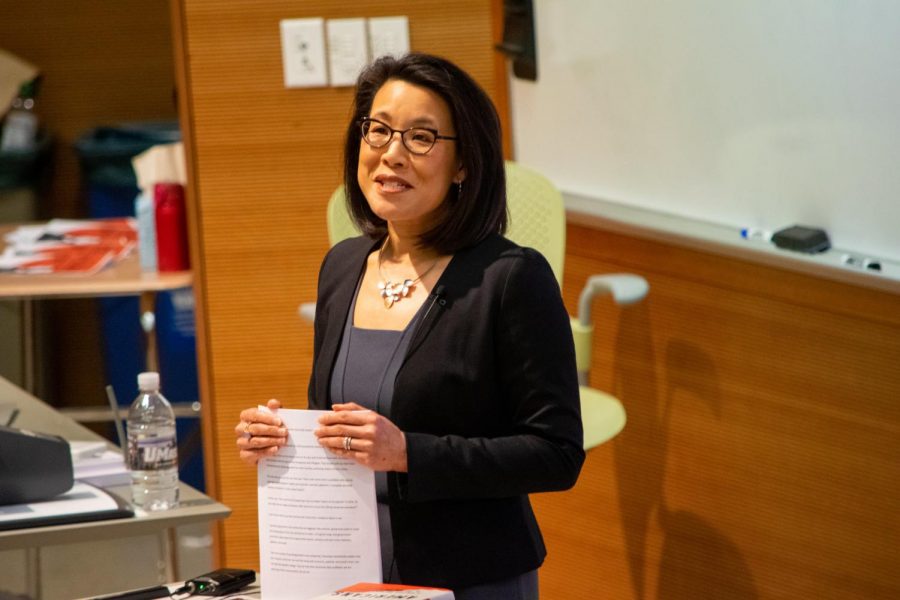Xenophobia in United States immigration policy persists throughout history, despite our country’s democratic values of being a welcoming nation, according to Erika Lee.
In her lecture titled “Xenophobia in America: How We Got Here and What’s at Stake,” Regents Professor of History and Asian American Studies Erika Lee, spoke in the Integrative Learning Center at the University of Massachusetts about the history of xenophobia, drawing from her book “America for Americans.”
In his introduction of the event, Five College Associate Professor of History Richard Chu highlighted Lee’s work at the University of Minnesota’s Immigration History Center as its director. He also mentioned how Lee’s book has gotten on many “best book” lists, including in Time Magazine and in USA Today.
“History shows that xenophobia is an American tradition that dates back to the founding of our nation and has endured across the centuries,” said Lee. “Xenophobia…has existed alongside and disciplined our nation of immigrants, determining just who can enter our nation and who cannot, who can become assimilated into typical Americans, and who remain forever foreigners.”
Lee’s event was the “Distinguished Annual Lecture,” which celebrates the 1996 establishment of the UMass/Five College Graduate Program in History. The annual lecture is delivered by a prominent historian. This year, the event was sponsored by many organizations, including the Bhutanese Society of Western Massachusetts, the Pioneer Valley Workers Center, the Jones Library and the Center for Multicultural Advancement and Student Success, according to the event website.
Lee used the visual aid of political cartoons and xenophobic propaganda to make connections between racism in American history, such as displacement of Indigenous people during colonial times, the “Know-Nothing” Party of the 19th century, the Chinese Exclusion Act and immigration quotas of the 20th century and more, to current xenophobic ideologies toward Muslims and Mexicans.
“This intersection of race, gender, class, religion has been an important aspect of defining xenophobia but it is clearly race that has been the most important factor in which foreigners have been decreed as threats and which foreigners have been welcomed,” said Lee. “This is because xenophobia is not something that rises and falls – it is actually a form of racism that is functional alongside slavery, settler colonialism, conquest segregation and white supremacy.”
In her book, Lee, explored the history and patterns of xenophobia in order to better understand the phrase “America for Americans.” The day after the 2016 election, Lee was teaching immigration history at the University of Minnesota. This was one of the moments when she was inspired to write her book, as students asked questions about the election results.
“They also had a long list of questions and they all coalesced around two basic ones, and the first one was ‘how can we elect a candidate [like Trump]?’ None of the answers I was giving were satisfactory and I knew I needed to write this book,” said Lee.
Lee explains how some say xenophobia ebbs and flows with the rising and falling of stressful times like recession, war and political conflict, and that xenophobia exists only within few paranoid extremists in a prominently welcoming nation.
“Nativism continues to drive America first policies that opposed involvement in both world wars, supported immigration restriction, and fueled the white nationalism that helped elect Donald Trump to the presidency in 2016,” said Lee. “With so much at stake, understanding exactly how xenophobia works is fundamental to the future of American democracy and for the creation of a more humane global society.”
Leigh Appelstein can be reached at [email protected].




















